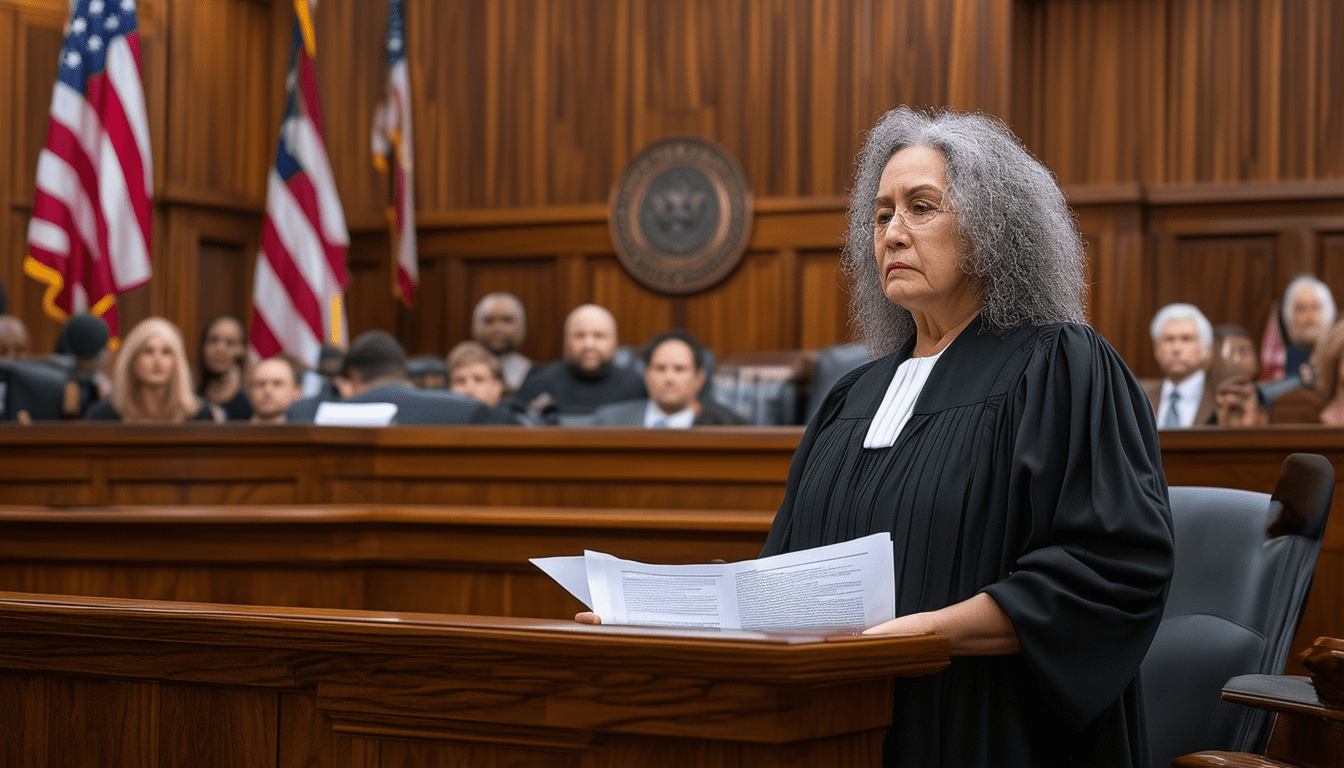Court Hearing Spotlights Paid Petition Circulator’s Testimony on Nebraska’s Medical Marijuana Signatures Challenge
|
IN BRIEF
|
The recent court hearing shines a spotlight on the complexities surrounding the legal challenges faced by the Nebraskans for Medical Marijuana campaign. Central to this case is the testimony of a paid petition circulator who has come forward amidst allegations of fraudulent signatures collected for medical marijuana ballot measures. As the trial unfolds, it raises critical questions about the integrity of the petition process and the implications for voters in Nebraska.

The ongoing court hearing in Nebraska has brought to light the complexities surrounding the signatures collected for medical marijuana initiatives. Central to this case is the testimony of a paid petition circulator, whose admissions of improper actions raise questions over the legitimacy of the signatures alleging fraud. As the trial unfolds, the implications for medical cannabis legislation in Nebraska become increasingly significant.
Background of the Challenge
The court proceedings are focused on two medical cannabis ballot measures, with claims that the campaign to place these measures on the ballot has been marred by fraudulent or malfeasant signatures. The lawsuit posits that the campaign fell short of the required 86,499 signatures due to alleged misconduct by notaries and circulators. This is critical as it impacts the ability of voters to decide on the legalization of medical cannabis in the upcoming election.
Testimony from the Paid Circulator
On the stand, Jennifer Henning, a paid petition circulator, admitted to illegally notarizing signatures she did not personally collect, suggesting that inappropriate practices were tolerated within the campaign. Taking the jurors through her actions, Henning described how she signed off on at least 18 signatures from Seward County, which raised integrity issues concerning the ballot’s credibility. This testimony casts a shadow on the entire collection process used by the campaign.
Current Legal Environment
The Nebraska Secretary of State’s office has emphasized that petition circulators are required to collect signatures in front of a notary, which should only validate signatures signed in their presence. Henning’s revelations point to a larger problem where many signatures may not meet this legal standard. Witness accounts and analysis of collected documents have shown numerous instances of missing or improperly executed notarizations.
Henning’s Motivations
Henning shared her motivation for joining the campaign, emphasizing her drive to support her son who suffers from severe health issues. Although her intentions seemed sincere, her prior felony convictions for fraudulent activities have complicated her credibility. Her struggle with personal accountability and her desire to advocate for her son clash sharply, reflecting the challenging nature of the situation.
Investigative Findings
The trial also featured testimony from John “Jake” Brennan, a fraud investigator for the Nebraska Attorney General’s Office, who highlighted overarching issues in signature integrity. Brennan’s investigation revealed that a significant portion of the collected signatures had malfeasance, including a 50% rejection rate for some circulators. This pattern of errors raises critical questions about the reliability of the documentation and how the measures reached the ballot.
Future Implications for Medical Marijuana
Regardless of the trial’s outcome, the measures remain on the general election ballot. Public sentiment toward medical marijuana in Nebraska is shifting, with recent polls indicating strong support for legalization. As awareness of the signatures’ legitimacy grows, voters may weigh these judicial findings heavily when casting their ballots. This creates a pivotal moment that transcends the courtroom, potentially reshaping the cannabis landscape in Nebraska.
Conclusion: A Campaign Filled with Integrity?
Despite the troubling testimony and allegations, campaign leaders maintain that their efforts uphold integrity and that they are committed to ensuring the measures proceed to vote. The question remains whether the hearing will reveal deep-rooted problems or lead to a more informed conversation about medical marijuana legalization in Nebraska. As the trial continues, its ripple effects could be felt well beyond the courtroom walls.
Key Aspects of the Nebraska Medical Marijuana Signatures Challenge
| Aspect | Description |
| Testifying Witness | Jennifer Henning, a paid circulator, provided testimony against alleged fraudulent signatures. |
| Fraud Allegations | Claims include notary malfeasance and circulator fraud affecting ballot access. |
| Signature Requirement | A total of 86,499 valid signatures required for ballot measures. |
| Investigation Findings | Brennan reported significant errors in signature collection, including missing notary stamps. |
| Petition Circulator’s Role | Circulators must collect signatures in the presence of a notary. |
| Defense Arguments | Petition sponsors argue some errors may have been unintentional mistakes. |
| Henning’s Background | Henning has prior convictions and expressed a desire for accountability. |
| Trial Developments | Trial expected to continue as Nebraskans prepare to vote on medical cannabis measures. |

The recent court hearing in Nebraska stands as a significant event revolving around the paid petition circulator’s testimony regarding alleged fraudulent signatures collected for medical marijuana ballot initiatives. The testimony provided insight into the ongoing challenges faced by the campaign, revealing a contentious backdrop as voters gear up for the upcoming election.
Focus on Allegations of Fraudulent Signatures
The trial, which has drawn attention statewide, involves accusations that the campaign for medical cannabis did not meet the required 86,499 signatures due to notary malfeasance and errors committed by petition circulators. These allegations center on a civil lawsuit that seeks to invalidate the signatures gathered for two medical marijuana ballot measures.
John “Jake” Brennan’s Testimony
During the proceedings, John “Jake” Brennan, a fraud investigator from the Nebraska Attorney General’s Office, discussed the significant rate of signature rejections linked to various circulators. The testimony underscored the complications arising from improper notary practices, including instances of self-notarization and missing signatures that cast doubt on the integrity of the petition process.
Testimony from Circulator Jennifer Henning
Testifying on the stand, Jennifer Henning, a paid petition circulator from Omaha, recounted her experiences while advocating for medical marijuana legalization. She disclosed that she had inadvertently signed off on invalid signatures, claiming she believed these actions were in compliance with campaign instructions. Henning’s past, marked by felony convictions, sharpened scrutiny from attorneys and raised questions about the credibility of her testimony.
The Human Factor Behind Advocacy
In the courtroom, Henning shared her motivations for participating in the campaign, particularly her desire to help her profoundly disabled son who suffers from severe medical conditions such as epilepsy. Despite her rocky past, her passion for the cause illuminated the personal stakes involved in the trial, showcasing the desperation of families seeking relief through medical marijuana.
Implications for the Campaign and Voters
As the hearing progresses, the implications for the campaign are profound. The outcome could determine whether reasonable measures for medical marijuana access in Nebraska proceed to a vote. Regardless of the court’s decision, Nebraskans will still have an opportunity to cast their votes on the matter come election day.
Continued Public Support for Medical Marijuana
Interestingly, public sentiment appears to stand in favor of medical marijuana legalization despite the ongoing legal challenges. Recent polls indicate that nearly 60% of Nebraska voters support the legalization measures, suggesting a strong community push for reform even amid legal uncertainties. This persistent advocacy signals a growing recognition of the benefits associated with medicinal cannabis, as evidenced by similar movements across various states.
The Path Forward
Witnesses and experts continue to share insights amidst the courtroom drama, raising questions about the procedural integrity of the petition process. As the trial unfolds, the focus remains not only on the legality of the signatures but also on the broader implications for cannabis legislation in Nebraska. Stakeholders and advocates alike are eagerly monitoring developments, with the potential for significant shifts in public policy hinging on the court’s findings.
- Hearing Date: Second day of trial
- Key Witness: Jennifer Henning, paid petition circulator
- Legal Implication: Challenge on medical marijuana ballot signatures
- Signature Requirement: 86,499 signatures needed
- Allegations: Fraudulent signatures and notary malfeasance
- Testimony Focus: Illegally notarized signatures
- Support Motivation: Personal reasons related to children’s health
- Trial Involvement: Nebraska Attorney General’s Office
- Potential Outcome: Future of medical cannabis legalization in Nebraska
- Public Sentiment: Majority support for legalization measures
Overview of the Case
The recent court hearing regarding the signatures collected for Nebraska’s medical marijuana ballot measures has unveiled significant testimony from a paid petition circulator. This trial aims to challenge the validity of these signatures, with claims of fraud and malfeasance taking center stage. Crucial to these proceedings was the testimony of Jennifer Henning, who acknowledged signing off on numerous signatures that she did not collect personally and raised questions about the processes followed by the campaign.
Understanding the Testimony of Petition Circulators
It is essential to highlight the role of petition circulators in the ballot measure process. Circulators are responsible for gathering public support by collecting signatures, and their actions can significantly impact the legitimacy of a campaign. Henning’s testimony revealed a potential breach of ethical standards, alleging that she improperly notarized signatures, thereby breaching the legal obligations of circulators.
This situation emphasizes the need for strict adherence to regulations governing petition circulation. Authorities must ensure that individuals involved in this process are fully aware of their responsibilities and the legal consequences of non-compliance.
The Role of Notaries and Legal Requirements
The involvement of notaries in these proceedings has drawn attention to the legal requirements that govern the notarization of signatures. Notaries serve as witnesses to the signing and must confirm that signatures are collected in their presence. The allegations against Henning indicate potential violations of these laws, thereby undermining the integrity of the signatures collected.
It is crucial for notaries to uphold their responsibilities to maintain the credibility of the petition process. Training programs must be implemented to educate notaries on their duties, thereby reducing instances of fraudulent practices.
Addressing Fraud and Misconduct
The allegations of fraud and misconduct have raised significant concerns regarding the integrity of the medical marijuana ballot measures in Nebraska. Testimonies from fraud investigators indicated a disturbingly high rate of signature rejection based on missing notary signatures and improper notarizations. Such discrepancies highlight a troubling trend that could compromise the effectiveness of advocacy campaigns.
To combat this issue, a rigorous review system should be established to monitor the collection and verification of signatures. Enhanced investigative protocols may be required to identify fraudulent activities early in the process, thus maintaining the integrity of the initiative.
The Emotional Stakes of the Testimony
Henning’s testimony also offered a glimpse into the intense emotional stakes involved in this case. As a parent of a disabled child, she initially joined the campaign to advocate for better access to medical marijuana, raising poignant questions about the intersection of personal motivations and campaign integrity. This human element underscores the importance of trust within advocacy movements and highlights the feelings of betrayal when misconduct arises within these efforts.
Integrating personal stories and emotional anecdotes in campaigns may galvanize support, but it also requires continuous oversight to ensure those stories honor the integrity of the cause.
Recommendations for Future Campaigns
To strengthen future campaign initiatives, several key recommendations are essential:
- Training for Circulators and Notaries: Implement comprehensive training programs for petition circulators and notaries to ensure they understand their legal responsibilities and the ramifications of their actions.
- Enhanced Oversight: Establish a monitoring system to oversee the signature collection process and flag any irregularities immediately.
- Public Awareness Campaigns: Develop public educational campaigns to inform voters about the importance of maintaining the integrity of signature collection efforts.
- Accountability Measures: Create clear accountability measures for circulators and notaries, integrating stricter penalties for fraudulent activities.
These recommendations, if implemented, will contribute to preserving the integrity of future initiatives and enhance public trust in advocacy efforts.
Frequently Asked Questions (FAQ)
What is the focus of the court hearing in Nebraska? The court hearing is centered on a challenge to signatures collected for two medical marijuana ballot measures.
Who testified during the trial? Jennifer Henning, a paid petition circulator, testified about her involvement in collecting signatures and alleged irregularities related to notary practices.
What accusations are being made against the campaign? The lawsuit alleges that the campaign failed to collect the necessary number of valid signatures due to claims of fraud and malfeasance involving notaries and circulators.
What specific allegations were made by Henning regarding her actions? Henning claimed she signed off on signatures she did not personally collect and implicated a ballot sponsor in wrongfully notarizing those signatures.
Why did Henning participate in the petition campaign? Henning joined the campaign to support her children, particularly her disabled son who suffers from various medical conditions.
What issues did Henning admit to regarding her past? Henning acknowledged a history of fraudulent activity and has been under probation due to previous felony convictions.
What did Henning say about her understanding of the circulator-notary requirement? Henning stated that she was unaware of the necessity for notarization to be done in the presence of the circulator and confessed to making mistakes.
What was the reaction from the Nebraska Attorney General’s Office to the signatures challenge? The Attorney General’s Office highlighted serious discrepancies, claiming that a significant number of signatures were invalid based on various errors.
How does Henning describe her current standing within the campaign? Henning noted feeling ostracized from the campaign following her testimony and accused campaign leaders of attempting to erase evidence of wrongdoing.
What is the potential impact of this trial on the medical marijuana initiative? The outcome of the trial could potentially invalidate a substantial number of signatures, thus jeopardizing the validity of the ballot measures.





Post Comment